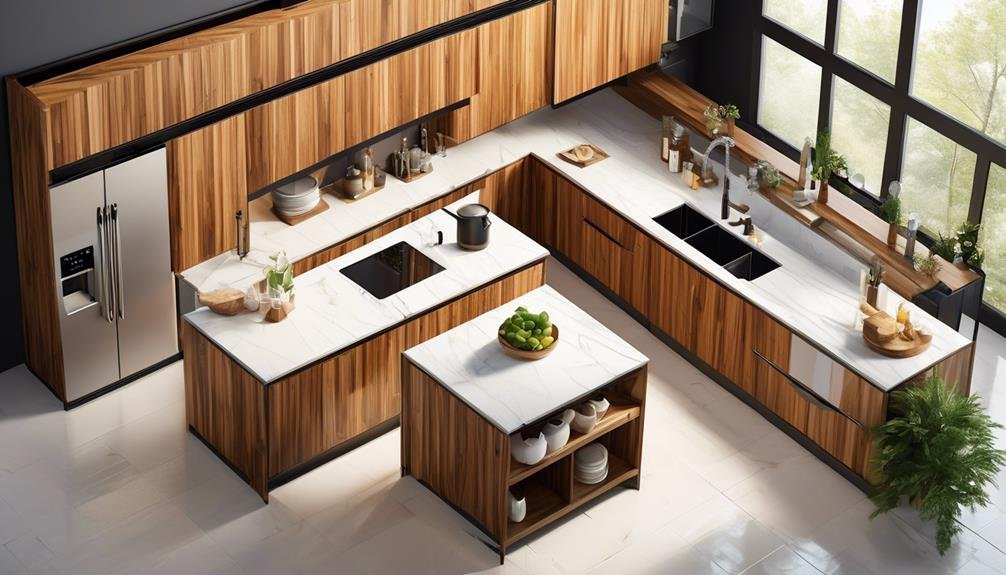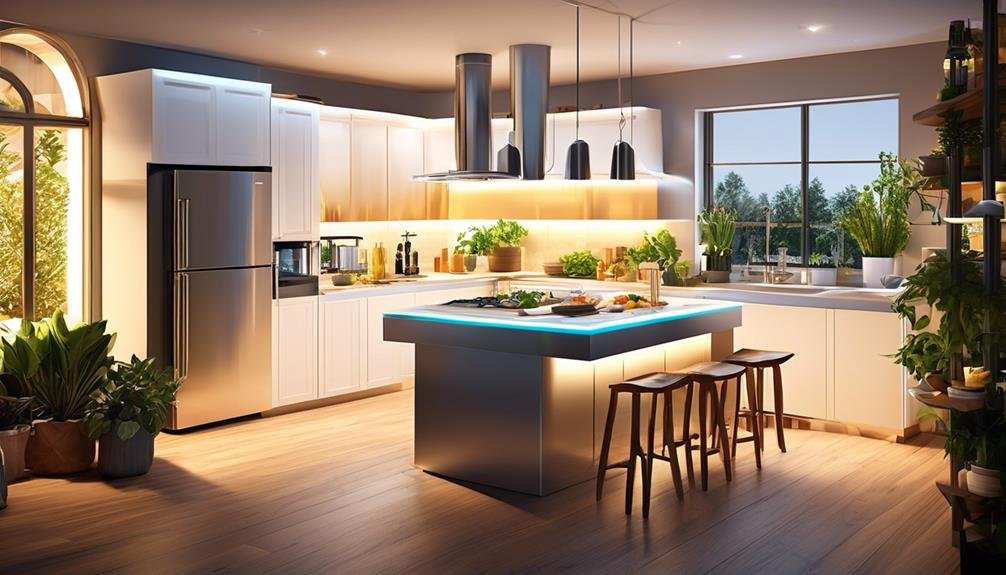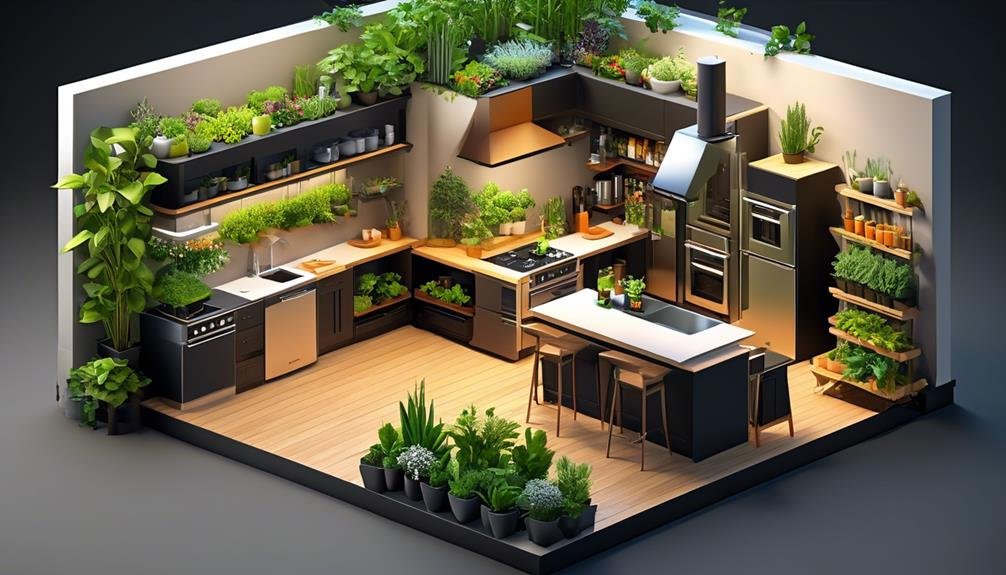As you stand in your kitchen, preparing a meal for your family, have you ever wondered how you could make your kitchen more sustainable? Well, look no further. There are several impactful kitchen upgrades that can help you minimize your environmental footprint while still maintaining the functionality and style of your space.
From energy-efficient appliances to efficient lighting options, these upgrades not only benefit the planet but also contribute to a healthier and more sustainable lifestyle.
So, why wait? Let's explore the most impactful kitchen upgrades for sustainable living together.
Key Takeaways
- Upgrading kitchen appliances to energy-efficient models, such as those with an ENERGY STAR label, can significantly reduce energy consumption.
- Installing low-flow faucets and dual-flush toilets can greatly reduce water usage in the kitchen.
- Choosing sustainable materials for countertops and cabinets, such as bamboo, recycled glass, reclaimed wood, or paper composite, can help promote eco-friendly practices.
- Implementing efficient recycling and composting systems can reduce waste and conserve valuable resources in the kitchen.
Energy-Efficient Appliances
Upgrade your kitchen with energy-efficient appliances to reduce your environmental impact and lower your utility bills. Energy-efficient appliances are designed to use less energy while still providing the same level of performance. By replacing your old appliances with energy-efficient ones, you can significantly decrease your energy consumption and contribute to a greener planet.
When choosing energy-efficient appliances, look for the ENERGY STAR label. This label ensures that the appliance meets strict energy efficiency guidelines set by the Environmental Protection Agency. ENERGY STAR appliances use up to 50% less energy than standard models, which translates to significant savings on your energy bills.
Start with your refrigerator, as it's one of the biggest energy consumers in your kitchen. Opt for a model with a high energy efficiency rating and features like adjustable temperature controls and automatic defrost.
Next, consider upgrading your dishwasher to an energy-efficient model. Look for a dishwasher with a low water consumption rate and multiple washing cycle options. This way, you can choose the most energy-efficient setting for each load.
Lastly, replace your old stove and oven with energy-efficient models that have features like induction cooktops and convection settings. These features not only save energy but also cook food more efficiently.
Water-Saving Fixtures
When it comes to creating a sustainable kitchen, another important aspect to consider is the installation of water-saving fixtures. These fixtures can help you reduce your water consumption and contribute to a more eco-friendly lifestyle. Here are some water-saving fixtures that you can consider for your kitchen:
| Fixture | Benefits |
|---|---|
| Low-flow faucet | Reduces water usage by up to 30% compared to traditional faucets. |
| Dual-flush toilets | Allows for different flushing options, saving water with each flush. |
| Dishwasher with sensors | Automatically adjusts water usage based on the amount of dishes in the machine. |
Installing a low-flow faucet can significantly reduce your water usage while still providing enough water for your daily tasks. Dual-flush toilets give you the option to use less water for liquid waste and more water for solid waste, resulting in overall water savings. Additionally, a dishwasher with sensors can help optimize water usage by adjusting the amount of water needed for each load.
Sustainable Materials for Countertops and Cabinets

Consider using sustainable materials for your countertops and cabinets to enhance the eco-friendliness of your kitchen. By choosing environmentally-friendly options, you can reduce the impact on the planet while still achieving a stylish and functional kitchen.
Here are some sustainable materials to consider:
- Bamboo: Bamboo is a fast-growing grass that's highly renewable. It's durable, water-resistant, and has a unique and natural look that adds warmth to your kitchen.
- Recycled Glass: Countertops and cabinets made from recycled glass aren't only beautiful but also sustainable. They're made from recycled glass bottles and have a sleek and modern appearance.
- Reclaimed Wood: Using reclaimed wood for your countertops and cabinets isn't only environmentally friendly but also adds character to your kitchen. Reclaimed wood is sourced from old barns, buildings, or other structures, giving it a unique and rustic look.
- Paper Composite: Paper composite countertops and cabinets are made from post-consumer recycled paper and a non-toxic resin. They're durable, heat-resistant, and have a smooth and modern finish.
Recycling and Composting Systems
To enhance the sustainability of your kitchen, implementing efficient recycling and composting systems is essential. Recycling and composting are simple yet effective ways to reduce waste and minimize your environmental impact.
By separating recyclable materials such as glass, plastic, paper, and metal from your regular trash, you can ensure that these items are properly recycled and made into new products. This not only conserves valuable resources but also reduces the need for landfill space.
Composting, on the other hand, allows you to transform organic waste, such as food scraps and yard trimmings, into nutrient-rich compost. This compost can be used to enrich your garden soil, reducing the need for chemical fertilizers and promoting healthy plant growth. Implementing a composting system in your kitchen can be as simple as using a countertop compost bin or installing an under-sink composting unit.
When setting up your recycling and composting systems, it's important to educate yourself on what materials are recyclable and what can be composted. Additionally, be sure to check your local recycling and composting guidelines, as they may vary depending on your area.
Efficient Lighting Options

Now let's shed some light on efficient lighting options for your sustainable kitchen. Here are some ideas to help you make your kitchen lighting more energy-efficient:
- LED bulbs: Switching to LED bulbs is a simple and effective way to reduce energy consumption. LED bulbs use significantly less energy and have a longer lifespan compared to traditional incandescent bulbs.
- Natural lighting: Utilize natural light by maximizing the use of windows and skylights in your kitchen. This not only reduces the need for artificial lighting during the day but also creates a bright and welcoming atmosphere.
- Motion sensor lights: Install motion sensor lights in areas that are frequently used, such as the pantry or kitchen entrance. These lights automatically turn on when someone enters the room and turn off when there's no movement, saving energy and ensuring that lights aren't left on unnecessarily.
- Dimmer switches: Adding dimmer switches to your kitchen lights allows you to adjust the brightness according to your needs. This not only saves energy but also creates a cozy ambiance for different occasions.
Frequently Asked Questions
How Much Money Can Be Saved by Using Energy-Efficient Appliances in the Kitchen?
You can save a significant amount of money by using energy-efficient appliances in your kitchen. They consume less electricity, resulting in lower utility bills and long-term cost savings.
What Are Some Water-Saving Fixtures That Can Be Installed in the Kitchen?
You can install low-flow faucets and aerators in your kitchen to save water. These fixtures reduce the amount of water used without sacrificing performance, helping you live more sustainably.
Are There Sustainable Materials Available for Countertops and Cabinets?
Yes, there are sustainable materials available for countertops and cabinets. Many options like bamboo, recycled glass, and reclaimed wood can be used to create eco-friendly kitchen surfaces that reduce environmental impact.
How Can Recycling and Composting Systems Be Implemented in the Kitchen?
To implement recycling and composting systems in your kitchen, start by setting up separate bins for recyclables and food waste. Make sure to educate yourself on what can and cannot be recycled or composted.
What Are Some Efficient Lighting Options for the Kitchen?
You can make efficient lighting upgrades in your kitchen by switching to LED bulbs, installing motion sensor lights, and using task lighting for focused areas. These changes can help reduce energy consumption and promote sustainable living.
Conclusion
When it comes to making your kitchen more sustainable, there are several impactful upgrades to consider.
Opt for energy-efficient appliances to reduce electricity consumption.
Install water-saving fixtures to conserve water.
Choose countertops and cabinets made from sustainable materials like bamboo or recycled materials.
Set up recycling and composting systems to minimize waste.
Lastly, switch to efficient lighting options to save energy.
These upgrades won't only benefit the environment but also make your kitchen more efficient and eco-friendly.






